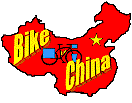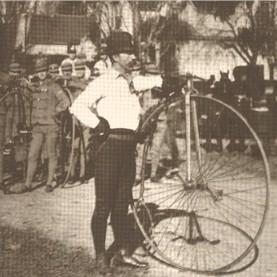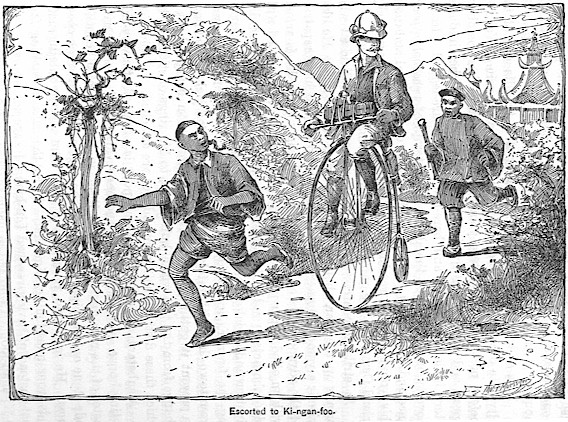China Cycling Travelogues
Do you have a China cycling travelogue you would like
to share here?
Contact us for details.
"Around the World of a Bicycle - Cycling through China in 1886 "
Part 7
Cycling through China - Part 1 | Part 2 | Part 3 | Part 4 | Part 5 | Part 6 | Part 7 | Part 8 | Around the World on a Bicycle - Maps and Pictures
It is a drizzly, disagreeable morning as I trundle out of the city gate over cobble-stones, made slippery by the rain. Walking before me is a slim young yameni-runner with a short bamboo-spear, and on his back a white bull's-eye eighteen inches in diameter; he is bare-footed and bare- headed and bare-legged. In the poverty of his apparel, the all-round contempt of personal appearance and cleanliness, and the total absence of individual ambition, this young person reminds me forcibly of our happy-go-lucky friend Osman, in the garden at Herat.
In striking contrast to him is the dandified individual who brings up the rear, about ten paces behind the bicycle. He likewise is a yameni-runner, but of higher degree than his compatriot of the advance; instead of a vulgar and rusty spear, he is armed with an oiled paper parasol, a flaming red article ornamented with blue characters and gilt women. Besides this gay mark of distinction and social superiority, he owns both shoes and hat, carrying the former, however, chiefly in his hand; when fairly away from town, he deliberately turns his red-braided jacket inside out to prevent it getting dirty. This transformation brings about a change from the two white bull's-eyes, to big rings of stitching by which these distinguishing appendages are attached.
A substantial meal of yams and pork is obtained at a way-side eating-house, after which yet another evidence of the sybaritic tastes of the rear-guard comes to light, in the form of a beautiful jade-stone opium pipe, with which he regales himself after chow-chow. He is, withal, possessed of more than average intelligence; it is from questioning him that I learn the rather startling fact that, instead of having reached Lin-kiang, I have not yet even come to Ki-ngan-foo. Ta-ho is the name of the city we have just left, and Ki-ngan-foo is whither we are now directly bound.
The weather at noon becomes warm, and the luxurious personage at the rear delivers his parasol, and shoes, and jade-stone pipe over to the slender and lissom advance guard to carry, to spare himself the weariness of their weight. Tea and tid-bit houses are plentiful, and stoppages for refreshing ourselves frequent. The rear guard assumes considerable dignity when in the presence of a crowd of sore-eyed rustics; he chides their ill-bred giggling at my appearance and movements by telling them, no matter how funny I appear to them here, I am a mandarin in my own country. After hearing this the crowd regard me with even more curiosity; but their inquisitiveness is now heavily freighted with respect.
Some of the costumes of the women in this region are very pretty and characteristic, and many of the females are themselves not devoid of beauty, as beauty goes among the Mongols. Particularly do I notice one to-day, whose tiny, doll-like extremities are neatly bound with red, blue, and green ribbon; her face is a picture of refinement, her head-dress a marvel of neatness and skill, and her whole manner and make-up attractive. Unlike her timid and apprehensive sisters of yesterday, she sees nothing in me to be afraid of; on the contrary, she comes and sits beside ine on the bench and makes herself at home with the peanuts and sweets I purchase, and laughs merrily when I offer to give her a ride on the bicycle.
The sun is sinking behind the mountains to the west when we approach the city of Ki-ngan-foo, its northern extremity marked by a very ancient pagoda now rapidly crumbling to decay. The city forms a crescent on the west bank of the Kan-kiang, the main street running parallel with the river for something like half a mile before terminating at the walls of the Manchu quarter.
The fastidious gentleman at the rear has betrayed symptoms of a very uneasy state of raind during the afternoon, and now, as he halts the procession a moment to turn the bull's-eye side of his coat outward, and to put on his shoes, he gives me a puzzled, sorrowful look and shakes his head dolefully. The trickiness of former acquaintances causes me to misinterpret this display of emotion into an hypocritical assumption of sorrow at the near prospect of our parting company, with ulterior designs on the nice long strings of tsin he knows to be in my leathern case. It soon becomes evident, however, that trouble of some kind is anticipated in Ki-ngan-foo, for he points to my revolver and then to the city and solemnly shakes his head.
The crescent water-front, the broad blue river and white sand, the plain dotted with smiling villages opposite, the tall pagodas, the swarms of sampans with their quaint sails, form the composite vol. II.-27 parts of a very pretty and striking picture, as seen from the northern tip of the crescent.
Near the old ruined pagoda the rear-guard points in an indifferent sort of a way to a substantial brick edifice surmounted by a plain wooden cross. Ah! a Jesuit mission, so help me Pius IX! now shall I meet some genial old French priest, who will make me comfortable for the night and enlighten me in regard to my bearings, distances, and other subjects about which I am in a very thick fog. Instead of the fifty miles from Kan-tchou-foo to Ki-ngan-foo indicated on my map, it has proved to be considerably over a hundred.
The sole occupant of the building, however, is found to be a fat, monkish- looking Chinaman, who knows never a word of either French or pidgeon English. He says he knows Latin, but for all the benefit this worthy accomplishment is to me he might as well know nothing but his own language. He informs me, by an expressive motion of the hand, that the missionaries have departed; whether gone to their everlasting reward, however, or only on a temporary flight, his pantomimic language fails to record. Subsequently I learn that they were compelled to flee the country, owing to the hostility aroused by the operations of the French in Tonquin.
Instead of extending that cordial greeting and consideration one would naturally expect from a converted Chinaman whose Fankwae accomplishments soar to the classic altitude of Latin, the Celestial convert seems rather anxious to get rid of me; he is evidently on pins and needles for fear my presence should attract a mob to the place and trouble result therefrom.
As we proceed down the street my appearance seems to stir the population up to a pitch of wild excitement. Merchants dart in and out of their shops, people in rags, people in tags, and people in gorgeous apparel, buzz all about me and flit hither and thither like a nest of stirred-up wasps. If curiosity has seemed to be rampant in other cities it passes all the limits of Occidental imagination in Ki-ngau-foo. Upon seeing me everybody gives utterance to a peculiar spontaneous squeak of surprise, reminding me very much of the monkeys' notes of alarm in the tree-tops along the Grand Trunk road, India.
Next: Cycling through China - Part 8
Cycling through China - Part 1 | Part 2 | Part 3 | Part 4 | Part 5 | Part 6 | Part 7 | Part 8 | Around the World on a Bicycle - Maps and Pictures
Bike China Adventures, Inc.
Home | Guided Bike Tours | Testimonials |
| Photos | Bicycle Travelogues
| Products | Info |
Contact Us
Copyright © Bike China Adventures, Inc., 1998-2012. All rights reserved.



